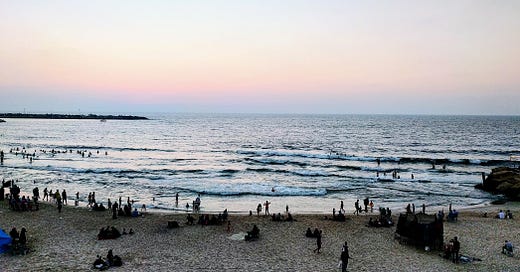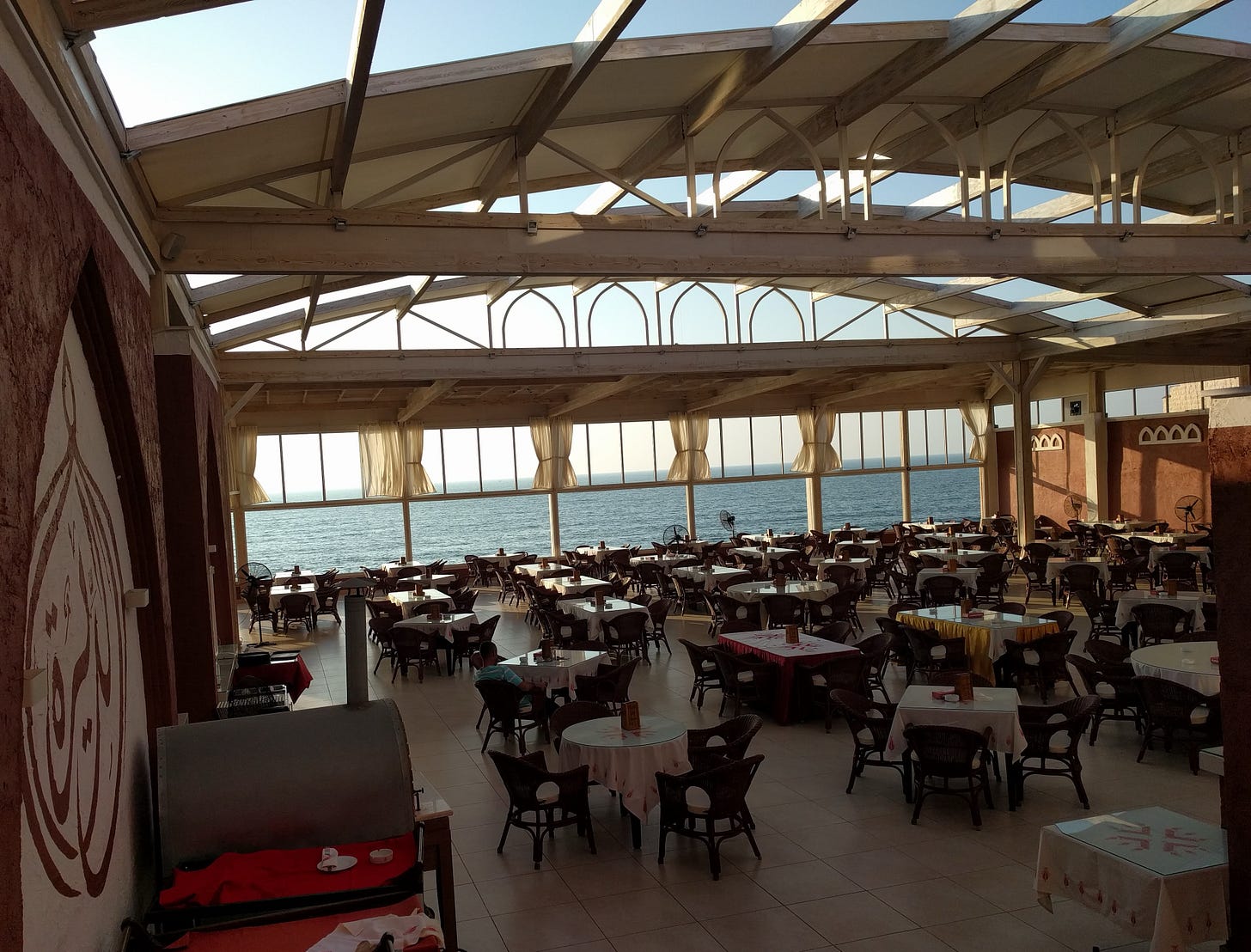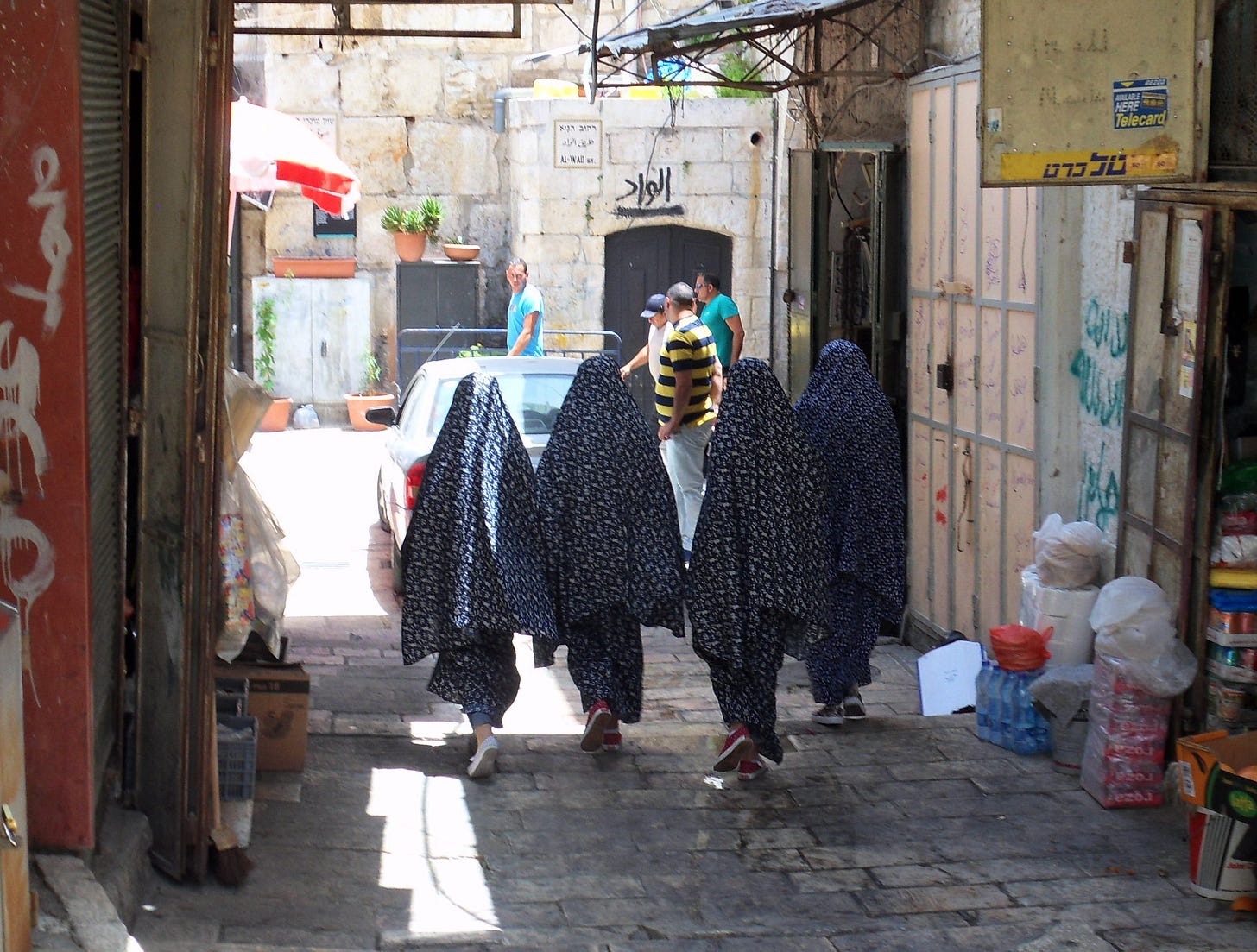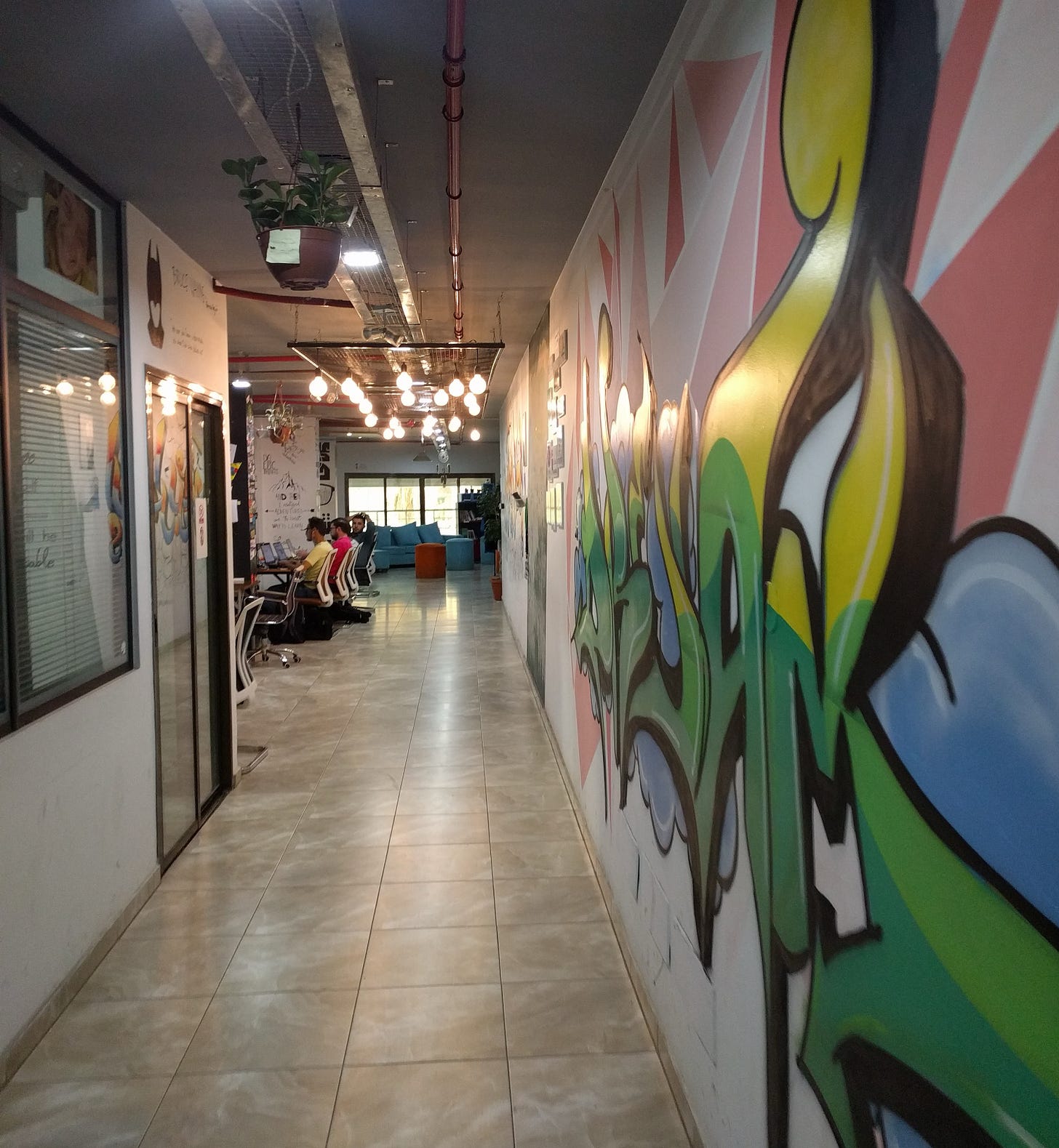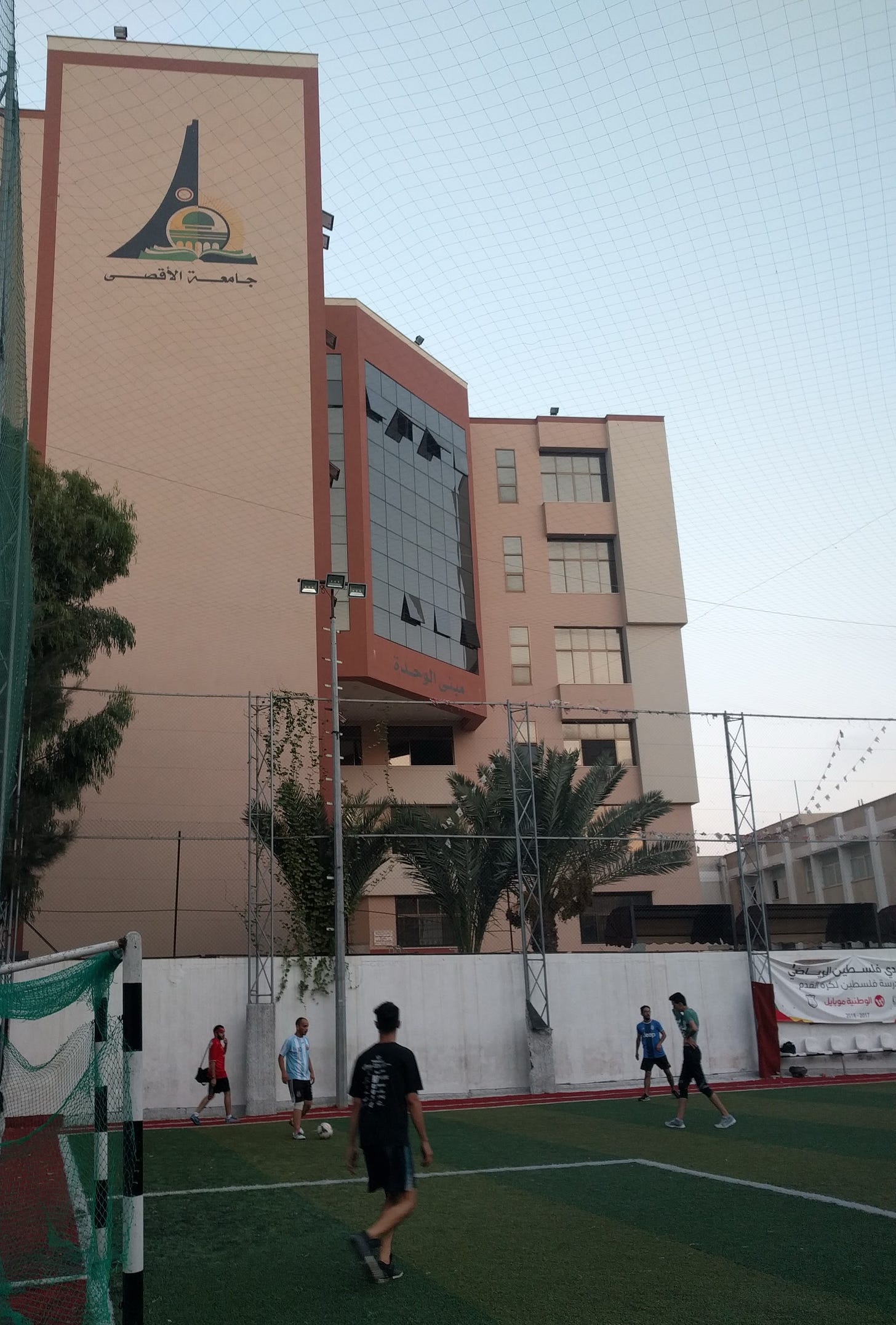This is Part Two of a series on my experiences visiting Gaza in 2015 and 2017. If you’re just joining (thank you!), I suggest beginning with Part One for context.
Also, our podcast episode on this topic is now available. It’s effectively an abridged audio version of these posts, so there’s a lot more info if you keep reading. But if you want a nice audio snack, then ~pod away~. (We’re available on most large podcast players, but if we’re not on yours, let me know.)
Finally, some amazing people I know from Gaza have begun an eSIM drive to send Gazans SIM cards so they can continue communicating despite internet outages. Mobile phone internet may sound like an unnecessary luxury in Gaza right now, but given the tremendous communications challenges there, a mobile data connection really can mean the difference between life and death — or at the very least, provide vital communication and comfort both for people within Gaza, and with friends and loved ones outside it. (And even if mobile data is a luxury, who says it’s unnecessary? Good writing and music got me through Covid — entertainment can be important.)
Instructions for buying an eSIM are here. Even $10 can buy a Gazan internet access, and I promise it feels great to actually do something real to help. Much better than hunching over your phone yelling at Bibi Netanyahu and Joe Biden.
Near the start of this conflict, a British friend reached out to ask about my experience in Gaza. She asked,
“How was Gaza for you? Dd they feel oppressed? I'm trying to understand if it really was an open air prison. On one hand I hear that, and on the other, it seems people loved their city.”
So this is my attempt at an answer.
Few know that Gaza is in fact beautiful. Parts of Gaza once served as beachside resorts, and another opened in 2015, though few guests came. The entire western edge of Gaza is one long stretch of sunny Mediterranean coast, as beautiful as that sounds. Gaza faces west toward the setting sun, and evening breezes rush in humid air from the water. Watermelons grow here, and strawberries too. Red and juicy things, bursting with life.
I visited Gaza for the second time in the fall of 2017. I remember the precise week, because it’s the same that a white nationalist in Charlottesville ran a car into Heather Heyer and killed her. I walked around my hotel listening to news coverage of Trump’s response, him saying there were “very fine people on both sides,” and wondering if I would come to regret not being home for whatever came next.
I stayed at the Al Deira hotel in Gaza City. I doubt it will exist through this war, but its restaurant was one gigantic patio perching directly over the beach, and every meal there you enjoyed stunning views of the ocean framed between big yellow pillars around the patio. Volunteers have a strict nighttime curfew for safety, and I watched the sunset over dinner there nearly every night. I could hear the beach sounds before the hotel mixing with those of the city behind as I ate: children playing, the honk of a car, waves crashing on sand, the call to prayer of a nearby mosque.
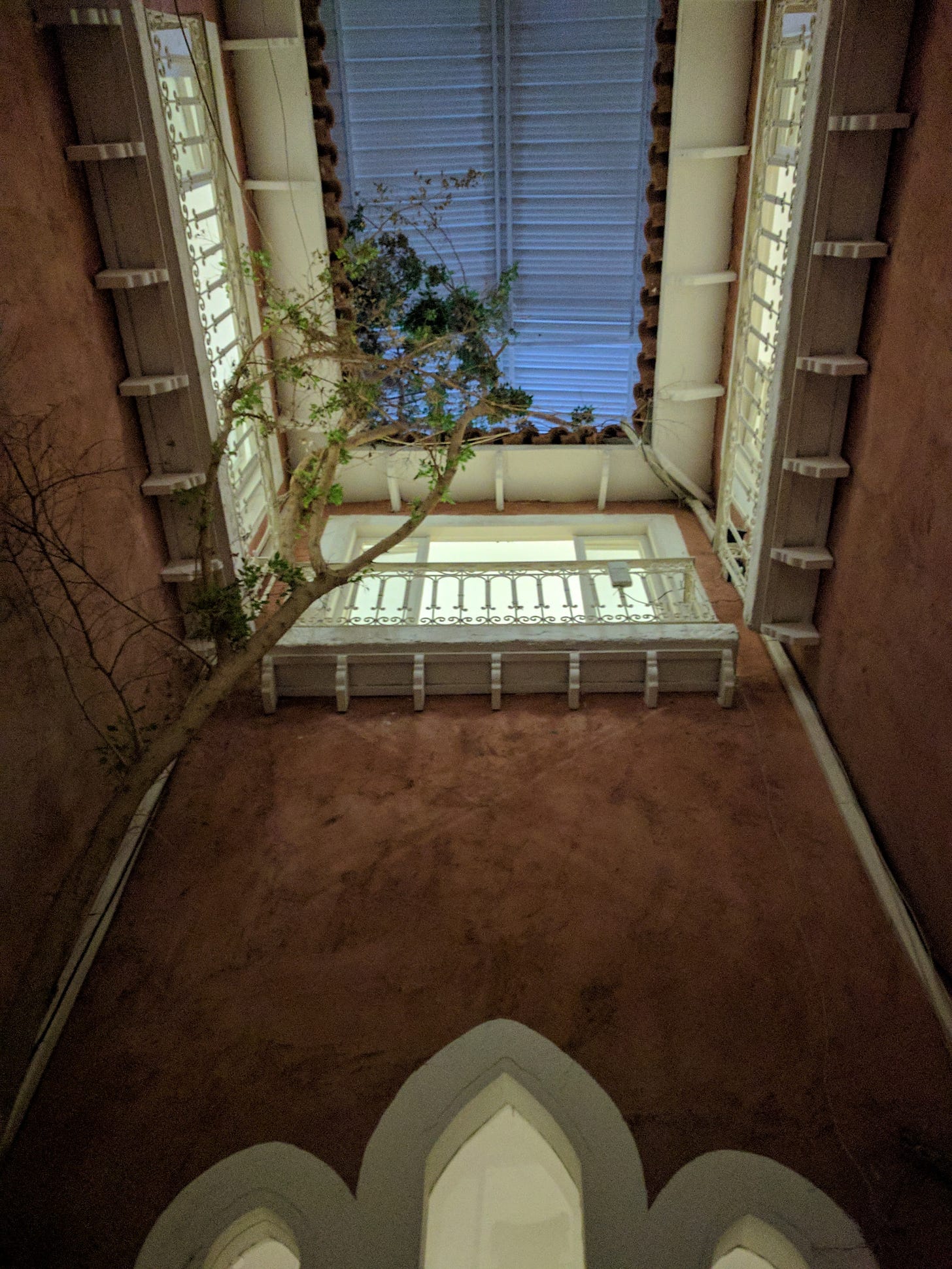
People who’ve visit the Middle East frequently remark on the hospitality they find there, and Gaza is no different. A smiling waiter at the hotel handed me a menu with a front that said, printed in the homey style of an American midwest diner: “Al Deira Hotel — your home in Gaza.”
A second man brought me a glass of mint lemonade, and said “Welcome back to Gaza.” I’d never met him, nor stepped foot in the hotel. But he said it like he meant it.
I stayed in Jerusalem for a few days before my first visit to Gaza, in a budget hotel on the city’s Palestinian side. When I checked in, exhausted and wretched from the flight, the owner saw my American passport, and his eyes grew large.
“An American!” he said.
He walked around the counter — he was a big guy, and it was late July in the Middle East, and we were both as sweaty as that implies. He shook my hand and pulled me in for a hug and said, “Thank you for staying here. Please, tell your friends to come, we’re good people!”
There’s no “p” sound in Arabic, so the way he said this last bit was, “Tell your friends to come, we’re good beeble!”
I’ve spent over a decade conducting research in the Global South, lucky enough to spend significant amounts of time in places like India, the Philippines, Indonesia, Nigeria, Kenya, and more. I had expected Gaza to look something like them — similar levels of poverty, of dilapidation, of struggle — and was surprised to arrive and learn it felt very different. But it took me a long time to figure out why.
When I first arrived in 2015, I shared an apartment with a handful of others visiting Gaza for the first time. We were shocked to find conditions even more challenging than we’d expected: limited power, limited food, limited drinking water. We ate breakfast together and shared our mutual surprise to realize that even our shower water tasted salty. This might seem small, but imagine spending a day in the ocean or at work in the hot sun, or an afternoon playing soccer. And then you come home, and that’s what you get: a salt-water shower.
The biggest war between Israel and Gaza before this one took place in 2014, and more than 2,000 Gazans were killed then — less than a tenth killed in the past three months.
That war occurred a full year before our visit, but its signs still marked the landscape wherever we looked: a woman and her son driving a horse cart past the shambles of a large mosque, identifiable only by its broken minaret; the high, dry bulb of a water tower blasted through with a hole the size of a Prius, evidence of an Israeli surgical strike. Some of the first people we saw as we entered Gaza City were children, clambering across the concrete remains of a large building. One boy scaled the remnants of a concrete wall, called to his friends, stood upright and peered west across the street to the sea.
To our surprise, we drove past a Pepsi bottling plant. We were told it was one of the few large employers there, and Coca-Cola finished building a plant in Gaza in 2016, too. A grim sort of business logic prevails in this: if soda companies can’t easily import their product to a market of over two million people, why not create it there instead?
When I returned to Gaza two years later, I didn’t know what to expect. Driving toward Gaza City after crossing Israel’s Erez border, I felt a sense of tentative hope. I saw no destroyed buildings, and Gazans somehow looked to me in better spirits: the streets busier, the sidewalks more bustling. I thought I heard more honking — perhaps, I imagined, a sign of vivacity. An impatience to go somewhere worth going.
But I was wrong. Only around ⅓ of the buildings in Gaza had been rebuilt since the 2014 war, and a UN report declared Gaza increasingly “unlivable.” It described how the vast majority of water was undrinkable, how most homes received fewer than three hours of power per day, how “an 11-year-old child [in Gaza] has not experienced more than 12 hours of electricity in a single day in his or her lifetime.” Unemployment hovered around 40% — and even higher, 60% or more, for young adults and women.
An especial tragedy in seeing all this in Gaza is that these conditions have sustained despite a nearly 97% literacy rate. There’s high college graduation rates, including among women. I expected to find more typical “development” challenges like poor education, literacy, and health knowledge and infrastructure, but was surprised to find a society rich with potential, limited only by politics and place.
I have a good friend from Gaza whom I’ll call Lina. (I’ll use pseudonyms to refer to most Gazans I’ve met here, unless their names and stories have already appeared in popular press.) Lina finally, through something like Herculean effort and lottery-like luck, made it to San Francisco and is now the co-founder of a successful startup there. Like many in Gaza, Lina grew up in a refugee camp. She eventually earned a Fulbright fellowship to study in the United States, and then completed a Master’s in electrical engineering at a prestigious university, and then she received four Silicon Valley job offers when she graduated. Lina, you could say, is an exceptional individual.
And she was lucky during the 2014 war in Gaza: she managed to leave. Early one morning during a brief ceasefire, her mother woke her and told her to pack up, fast. Egypt had briefly opened the Rafah border crossing, and they were going to try getting Lina through. She sewed Lina’s wallet into her pant leg for safekeeping and called a taxi, one of the only still offering rides during the war.
When Lina and her mom arrived at the border, they learned only Egyptians were allowed to cross. The booms of distant airstrikes grew louder; the border would surely close again soon. They were so certain Lina would be barred from entering Egypt that they focused on charging her phone so she could call a taxi home once she was.
But incredibly, Lina’s mom ran into family friends who were Egyptian. She asked them to claim Lina as a distant cousin and try bringing her across.
Even more incredibly, it worked.

Lina made it through the border, one Palestinian girl in a sea of Egyptians. But she realized, too late, that she hadn’t even said goodbye to her mother. Lina didn’t see her for three years after that.
And she didn’t dare return home, rightly fearful she’d never again leave — unwilling to risk the life she’d built in America for a brief glimpse of home. She missed her sister’s high school graduation, congratulating her tearfully via Skype from California. (And this was before Covid, when this still felt like a sad and alienating thing to do.)
Lina knew how challenging it could be to obtain an exit permit from Israel to leave Gaza. She’d done it once before. A few years before the 2014 war, she received a summer internship offer from Microsoft, in Cairo. But she waited eighteen months for a permit to leave — enough time for multiple summer internships to come and go and be forgotten. By the time she received the exit permit, Microsoft no longer had funding for the role.
“I don’t care,” she said. “I’m just so happy to finally see something outside Gaza!” And so she went to work, unpaid, in Cairo.
Years later, she told me with a shy laugh how impressed she was by the architecture there. “My god, how did they build those bridges?” she’d wondered. But of course in Gaza, there are very few: there’s the land, and the sand, and the sea.
Lina was twenty-two years old when she finally saw something outside Gaza. And she did so as the kind of person who can earn a Fulbright fellowship, a high-powered Masters degree, receive four job offers in hardware engineering, and then co-found and run a successful startup in San Francisco.
And still she was trapped — trapped, I use that word with intention — in a place the size of Philadelphia until she was twenty-two years old.
If she had so much trouble leaving, how should anyone else? The term “open-air prison” can sound hyperbolic if you haven’t heard stories like Lina’s — but once you have, the words start to resonate.
Lina and I got lunch one day in San Francisco in 2020, in the middle of Covid. We ate Syrian food in a park and she told me stories from her last summer in Gaza.
One was a memory of hiding with her brother under the staircase of their home as bombs fell during the 2014 war. They hid under their staircase because Gazan homes lack basements and bomb shelters, the other war zone accouterments one might expect.
And told me how she heard the three-story house beside hers — all thirteen neighbors inside it, parents, children, and extended family — destroyed by an Israeli missile.
It’s one of her last memories of home.
A friend in the Gaza Sky Geeks office, Yusuf, wears a nearly inexhaustible grin; it’s hard to see him and not smile back. And he is busy. When I first met him, he carried three mobile phones, one per job he worked. I saw him speak on two alternately, one per ear, on more than one occasion.
Yusuf grew up in Shuja'iyya, a city which was almost completely razed during the 2014 war. Destruction there was so complete that US military officers interviewed afterward described the IDF’s strategy as one aimed at “cratering the neighborhood.”
But Yusuf continued working at the tech accelerator throughout the war, helping grow the office from a very early stage. And he still lived in Shuja'iyya when I visited, in 2015 and still later in 2017, commuting into Gaza City for work.
The Gaza Sky Geeks office is brightly-lit and filled with plants, its interior walls covered in colorful illustrations and inspirational phrases — it feels, more or less, like a modern tech office. (I’ve chosen to use the present tense to describe the office here, though I have no idea if it still stands.) Those accepted to work there are given months of mentorship, internet, office space, lunch, coffee, electricity, clean water — so many things that are hard to come by in Gaza. I found it very hopeful to stand in the Gaza Sky Geeks office, full of smart and ambitious people working toward a brighter future. It is easy, in the office, to almost forget you are in Gaza — and indeed, I imagine this is some of its appeal.
So I’ve wondered how it must feel for so many who work in the office to go home each night — back, as it were, into the realities of Gaza. Like Yusuf to Shuja'iyya, the target of a “cratering campaign” a few years earlier, and others to places just like it.
For many of us, if a tragedy befalls our home, we have the freedom to move somewhere new — to a new house or city, maybe even a new state. To start fresh, release old baggage, wave goodbye to old ghosts.
But what about in Gaza, the size of metro Philadelphia but more dense, where Lina waited 18 months for an exit permit, where over 70% of homes have been damaged in the past four months alone? I imagine the ghosts must just wander around, and the baggage must pile up, and up, and up.
One evening, some guys from the office invited me to a game of soccer. It was humid when we played; I took a few photos that look as if shot through shrink wrap, or out a sauna window. But the game was similar to any other on a summer evening anywhere in the world: the same rules, the same astroturf, the same injuries.
Sea breeze blew in the windows as we drove home after the game, and tall, dusty palms filed by them like cartoon panels holding worlds: a cluster of drab commercial towers; the new-looking university, which had been repaired since the 2014 war; two boys riding a single bicycle past a man repairing his truck. We passed the Pepsi factory, blue and gaudy but comforting to me somehow, here, a piece of home. We passed more businesses, apartment buildings, the coarse rubble of a building that blended into the city landscape. It was the only rubble on the block; two untouched buildings framed it on each side, and I wondered what it used to be.
The sun drew the world into long thick shadows on the sea air, and the night felt warm, alive. Ice cream and cicadas. We passed a gas station and park and city blocks of storefronts, some bustling and most not. Clusters of young men and young women moved past them, chatting, laughing, carrying shopping bags and groceries toward friends, families, homes, like any summer night anywhere else in the world.
Most talk of Gaza focuses on the region’s physicality, whether its isolation or bombardment. But Gaza is isolated digitally and financially, too — constraints which are far less visibly, and less visibly violent, but nonetheless incredibly pernicious for the long-term health of an economy and society.
News stories have highlighted how Israel shut down Gaza’s internet during the current war — but even before this war, Israel only allowed Gaza to install towers transmitting 2G cell data, a technology that was introduced to the world in 1992. 2G data is fast enough to send text messages and emails; maybe a photograph. Certainly no videos.
A friend in Gaza told me, grinning, how he and friends found they could receive a 3G signal seven floors up a particular building, at Gaza’s highest restaurant. The cell tower is in Israel, five miles east — over no-man’s land and razor wire and the ugly concrete wall. But the signal reaches.
The West Bank only gained permission from Israel to install 3G mobile towers in late 2015, and began running service as late as 2018. Again, much of the rest of the world was already using 4G by then, a full technological generation ahead. This includes America, much of Europe, and Israel, which had been using it since 2004.
Amazon doesn’t ship to Gaza, and only recently allowed shipments to the West Bank. PayPal still refuses to serve both Gaza and the West Bank, despite serving Somalia, Yemen, and even Israelis living in West Bank settlements. When I last visited, Gazans living abroad sent money home to support their families using services like Moneygram and Western Union, which charged exorbitant fees in line of 5 - 10% per transfer. All this may seem to pale in comparison with bombings, killings, a lack of fresh water or food. But imagine trying to run a business in these conditions.
One startup I mentored in the West Bank described the lengths they went to simply establish a bank account for their business. They discovered a bank in Virginia (as in, the US state of Virginia) that promised, as a promotion, to send ATM cards to customers anywhere in the world. So they created a business account with the bank and routed all their payments there, and occasionally withdrew business money from an ATM in Ramallah. This cost them a small fortune in ATM fees, but what other option did they have?
When I first visited Gaza Sky Geeks, I saw on the wall what they’d titled a “dream board”, a bulletin board where employees of the accelerator and hosted startups could post sticky notes describing their hopes for the future. Many were typical of aspiring tech CEOs in 2015: Become the next Mark Zuckerberg. Build the next Google. “Change the world”.
But others were less glamorous: End the war. Travel the world. Leave Gaza.
That’s it for this week — the series will continue next, where we’ll meet more amazing Gazans, and experience the border crossing from Gaza into Israel. Again, please consider buying a SIM card or three for Gaza! It really can do a lot for someone, and really can feel good in an otherwise frustrating, powerless time.
Song of the Week: DAM — “I Don’t Have Freedom”. I found this song on the 2009 album Checkpoint Rock: Canciones Desde Palestina, which features DAM and a number of other Palestinian artists.

